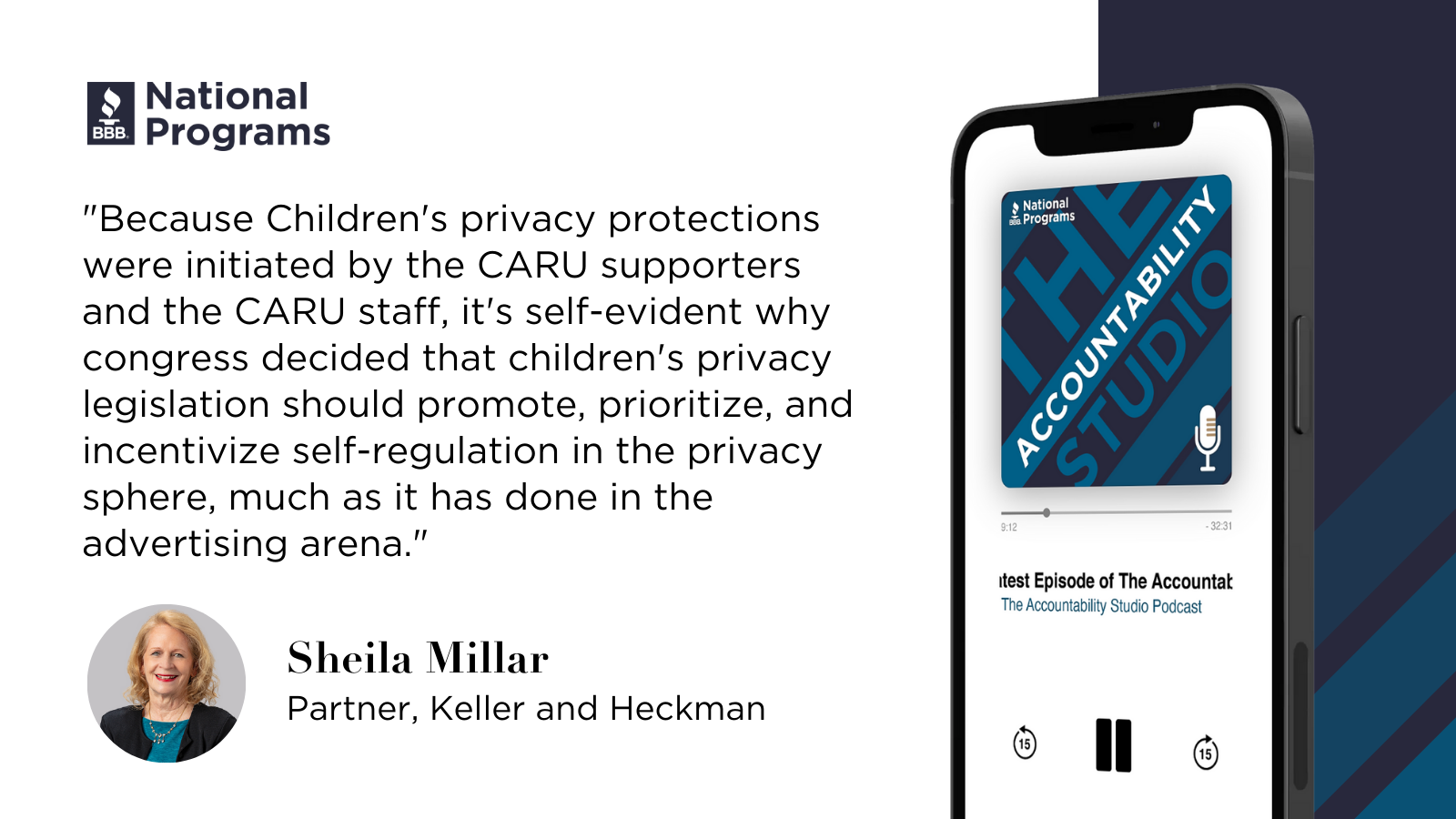
In this episode of Accountability Studio, Mamie Kresses, Vice President of the BBB National Programs Children’s Advertising Review Unit (CARU), moderated a discussion on Safe Harbor with special guests. Sheila Millar, a partner at Keller and Heckman, and Daniel Kaufman, partner at the law firm Baker Hostetler joined this episode to engage in an in-depth discussion on Safe Harbor and CARU.
CARU was the first and is the longest-running FTC-approved Children’s Online Privacy Protection Rule (COPPA) Safe Harbor.
The Safe Harbor provisions of COPPA and other self-regulatory frameworks intend to promote flexibility and efficiency by allowing businesses to tailor their compliance programs and reward participants’ good faith efforts to comply with the law.
This episode focuses on the role of Safe Harbor programs within CARU. Mamie and guests look at whether these programs effectively complement FTC enforcement and what the future holds for their provision in the Children’s Online Privacy Protection Act.
Mamie began with a quick refresher on the controversy swirling around the Safe Harbor provision of the COPPA rule.
“Recently, there have been concerns raised on the Hill that perhaps the Safe Harbor provision is not as robust as it should be. Or, as one representative puts it, perhaps it’s a dangerous part of the COPPA rule, allowing for rubber-stamping of businesses that use Safe Harbors.”
There were three points Mamie asked Sheila and Daniel to elaborate on regarding Safe Harbor:
- Their perspective value of the provision.
- Whether the provision should remain a part of the rule.
- Could the provision be improved or contemporized moving forward?
Value of the Provision
Sheila explained that self-regulation became a part of the COPPA framework because self-regulation was the source of the COPPA statute and rule. Before COPPA was enacted, CARU’s staff initiated children’s privacy protections. It was clear why Congress decided that children’s privacy legislation should promote, prioritize and incentivize self-regulation in the privacy sphere as much as it has done in the advertising arena.
Daniel responded with differing views on the subject matter. He believes that it is a means to help facilitate compliance. The FTC has about 40-45 people working on privacy issues. Only a small subset of that number work on kids’ privacy issues. The FTC does a great deal of work given their resources, but there are limitations to what they can do.
Safe Harbor Provision Integrated in the COPPA Rule
As to whether the provision should remain a part of the rule, Daniel notes that compliance with COPPA can be complex. The Safe Harbor provision provides a vital role for smaller organizations striving to comply with the law.
On the topic of whether the Safe Harbor provision could be improved, Mamie reminded listeners that Commissioner Chopra, head of the FTC in 2020, outlined many possible changes to the Safe Harbor framework to strengthen the program.
Are Improvements Needed?
Daniel believes the law is working well. He doesn’t think the suggestion to routinely review and vote on Safe Harbor provisions by the FTC is necessary.
Sheila believes the safe space provided by Safe Harbor participants and organizations would be compromised if participants were required to disclose their performance data to the public, including complaints and disciplinary actions. Mandated transparency does not allow participants to speak freely.
As an organization that runs a Safe Harbor, Mamie said she is looking forward to the FTC updates to COPPA.
The timeline for the updates isn’t expected anytime soon.
Visit COPPA Safe Harbor Services to learn more.
Listen to the full episode here.
